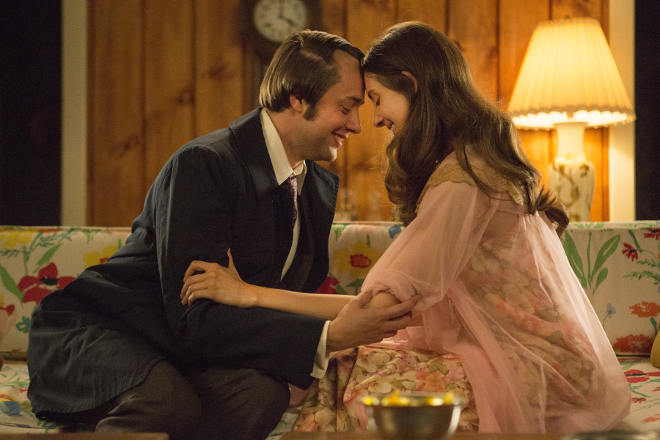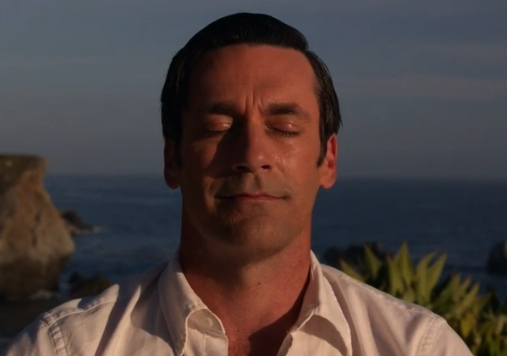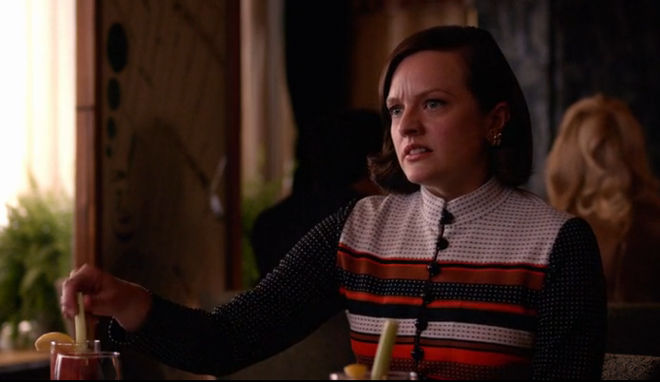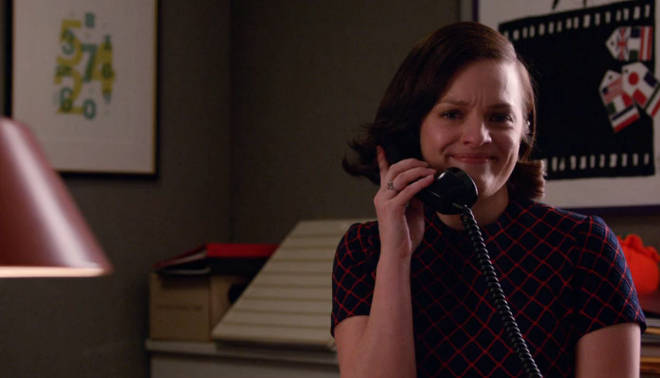Closing The Account: After All That, What Was ‘Mad Men’ Really Trying To Sell?
After 92 episodes, was it a satisfying ending? Depends what you were looking for.
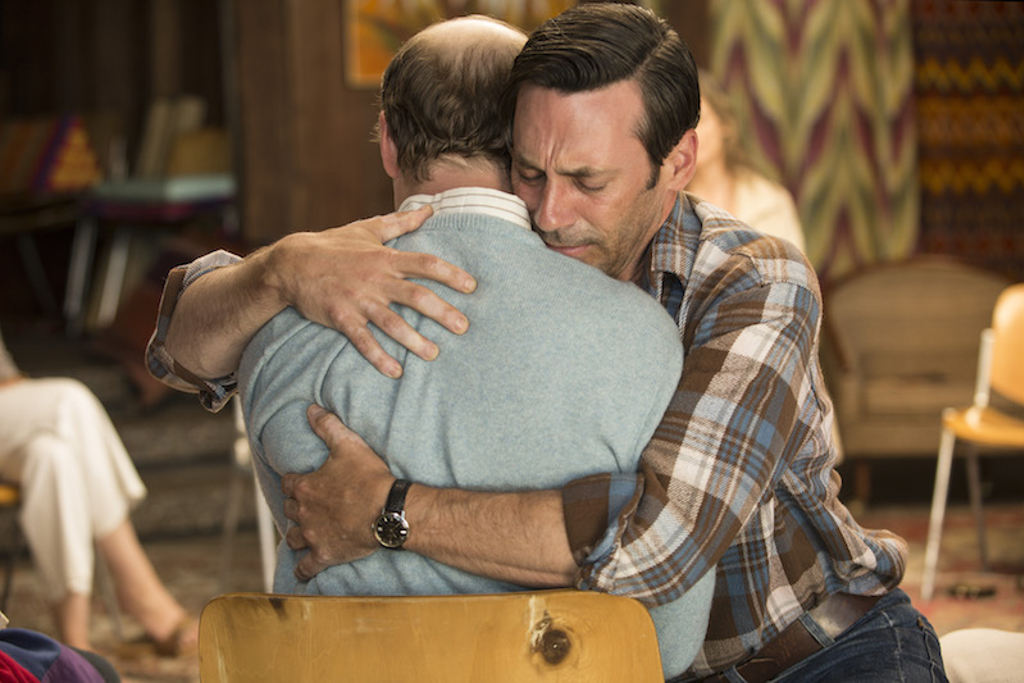
This contains spoilers to the series finale of Mad Men.
–
This is how Don instructs Peggy to make ads. This is how I’ve tried to approach writing about the finale of Mad Men. This show had everything, and after 92 episodes, so much of it. To try and sum the whole thing up feels ridiculous — as ridiculous as it must have felt, for the show’s creators, to try and write a conclusive ending. Or as crazy as it might be to take everything you know about life, love, human kind, and self, and boil it down to one sugary sweet slogan.
In the final moments of Mad Men’s finale, Don found a moment of inner peace, and turned that epiphany into one more great ad. Creator Matt Weiner and co. had one last episode to similarly summarise the long tangled journey of the show. So, did they succeed?)?
We’ve seen Don and Peggy do it innumerable times, designing campaigns for everything from Bacardi to beans. How do you condense the human experience into a digestible moment for the masses? How do you capture everything in one pithy remark?
You sit and talk your way around the idea, consider every angle, triangulate the research, look up an old adage and bottoms-up a new drink. It’s a rap session, there’s no wrong answers. You sweat and forget and find yourself back at square one, but you’re a new person (or are you?), and at least you’ve got some perspective, except it’s only a rear-view mirror glance at the next generation. What does it all come down to in the end?
“It’s toasted.”
“Limit your exposure.”
“Eat Life by the bowlful.”
“At last something beautiful you can truly own.”
“The jumping off point.”
“If I had my way you’d never have to advertise.”
“I’d like to buy the world a Coke.”
Before Mad Men even started its final run of episodes, multiple critics had prophesised the conclusive message of this somewhat inscrutable program. It’s about change! Progress! The future! America! Life! “Oh, is that all??” you can hear Pete Campbell scoff. “Well, you just finish up the artwork and we’ll sell it to Miss North and South Dakota, shall we?”
“It’s been done before, “ Roger might quip. “After all, someone in here must have voted for Kennedy.”
Fan fiction aside, Mad Men was never going to be summed up with a single tagline. It’s only ever the story behind the account that sells it in the boardroom.
The show paid as much attention to its bit players as it did its leads, and though we might criticise its fleeting glances at people of colour and its hackneyed portrayal of depression-era America, it successfully shattered the myth of the straight white male knight of Western mythology. No cowboy saved the day; everyone did it their way. It gave us glances into the lives of the rich and poor, men and women, straight and gay, conservative and progressive, happy and sad, broken and strong, yesterday and tomorrow. And yet for all its split focus and wandering detours and joyful moments of sheer poignant inanity…


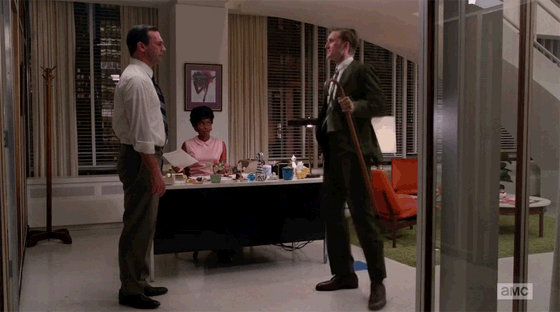
…Mad Men kept circling around a few central themes. They all popped up again in the finale.
Here, for old times’ sake, is maybe what Weiner was trying to sell us all along.
–
The Pitch: NOSTALGIA
The Product: Kodak, Mohawk, Glo Coat, Life Cereal, Hersheys
The Players: Pete Campbell, Betty Francis, Trudy Campbell, Bert Cooper, Henry Francis, Ken Cosgrove, Ted Chaough
It’s watching your mother wax the floor. It’s a bowl of cereal bigger than your head. It’s that one moment when you felt normal. It’s a time machine. It’s the dream of the life we thought we’d lead – the idea we were sold, or that we sold ourselves.
Don spelled it all out in season one, first looking back at his marriage, and then chasing the itch down each of life’s vertebrae, scratching away at his past, and women, and work. While we reblogged mid-century furniture and whiskey-filled tumblers, Mad Men picked at the scab of every old wound.
Can you ever go home again? Pete Campbell was the show’s true suit — the stiff who grasps at regimented success in a universe (Weiner’s) that rewards flexibility — and he managed to ramrod himself towards contentment. Pete couldn’t even give up his favourite sandwich when he moved across the country; is it any surprise he reinserted himself into this portrait of familial ideal? That nuclear family melted down and then simmered into a cushy Wichita lifestyle. The Campbells had their Charleston and danced it too.
–
The Pitch: DESIRE
The Product: Bacardi, London Fog, Jantzen Swimwear, Heinz Ketchup, Jaguar Cars
The Players: Don Draper, Roger Sterling, Jim Cutler, Bob Benson, Megan Draper, Harry Crane
Don never ended up meeting the Rolling Stones, but he did learn their eternal lesson: You can’t always get what you want, but if you try sometimes, you just might, get a consumer product that somewhat fills the gaping maw of unquenchable human greed.
Happiness is only the moment before you need more happiness – or, I dunno, the moment when you chill the fuck out and stop thinking big picture.
Roger’s mellowed into a bi-lingual gas, even without his name on the door anymore. And hey, maybe there’s more to legacy than having a male heir with your own name. You could ensure the future of your love child even when you don’t have to.
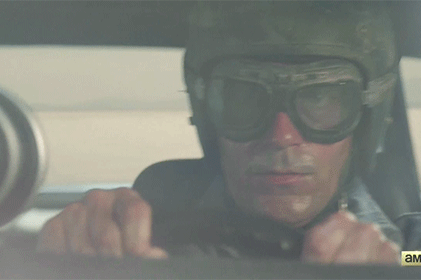
Racing through the salt flats, stuck somewhere between a charlatan and an artist, Don’s still chasing something to fill the hole, revving an engine that’s always about to bust. He gets the flick from the family he ditched, gets ditched from the family he never belonged to, and at the end of his tether gets Peggy to ask him to come home.
Hooooooome. Keep that last consonant ringing Don, bliss out on the echoes of your own emptiness. Who’s the only person you ever truly connected with? You bought her dinner, you bought her a drink. Anything else you’d like to purchase for your protégé? Maybe a bottle of pop?
Don survived the ‘60s (and himself) and sold it back to the world as a soda ad. Satisfied? I don’t know if he is, or if I am. But I was never satisfied by Rabbit Angstrom, or James Bond, or Barbie either. If Draper exists in the show as a cipher for an age, then so be it. I’ve gone through highs and lows with the guy, I’m cool with a little zen. Enjoy.
–
The Pitch: TOMORROW
The Product: Lucky Strike, Hilton Hotels, Hawaii, Chevy, Burger Chef, Coke
The Players: Peggy Olson, Joan Holloway, Sally Draper, Stan, Michael Ginsburg
What are the victories in Mad Men? How often has Peggy or Joan compromised or self-sabotaged in their warpath towards what we understand is equality, but what for them was a singular strike against a world full of stuffed shirt creeps?
The biggest cheer-out-loud moments in a series-long chorus of sighs were simple moments of success: Peggy wearing pants in the office; Joan smashing her nuptials with a vase to the noggin. Tomorrow is a blank space we fill with our dreams. Peggy will continue to carve out her place in advertising. Joan has employed a hippy as a secretary (gasp!), and turned her horrible apartment into a thriving production company. We know both will kick ass throughout the ages and hopefully meet for bloody marys every other weekend.
Peggy and Joan both changed the conversation in their own way – by declaring over and over again that they had every right to be included.
–
So what did Mad Men try and sell us in the end? Maybe, generously, the idea that the truth is complicated, and rarely satisfying, and that attitude plays a pretty hefty role in happiness. Don finally got somewhere close in the finale. You can be happy as long as you define happiness as what’s achievable, and sometimes that’s just the simplicity of hugging a likewise forlorn brother man. (I hope that fellow lonely man at Don’s group session finds his way out of his own private refrigerator of isolation.)
Paul, Ginsberg, Sal, Bob, Dawn, Ted – they all just want a little bit of human connection. Just like Don, most of them just wanted a hug. We’re all alone on the fridge shelf of life, and Don finally realised his extraordinary life has led to a universal feeling. If it’s not a cola, it might be a koan. Maybe Don is going to devote his life to helping people feel connected, via something other than the largest commercial product on Earth.
Did anyone else notice this? #MadMenFinale pic.twitter.com/9MthK2rQmD
— Emily Miller (@emillersmith) May 18, 2015
Why did I buy into Mad Men wholeheartedly, even if this final episode feels a little too easy? Because I had more fun, and felt more, watching this show than any other. I had great conversations, with myself, and with others. I guess I got a bit of person to person connection, via the beautifully fake people on my screen. Don stared into his own heart of darkness and saw a twinkle or two. Maybe they were effervescent bubbles…
Mad Men ended as it always was, a thoughtful meditation on that largest of emergencies: life. Cheers to that.
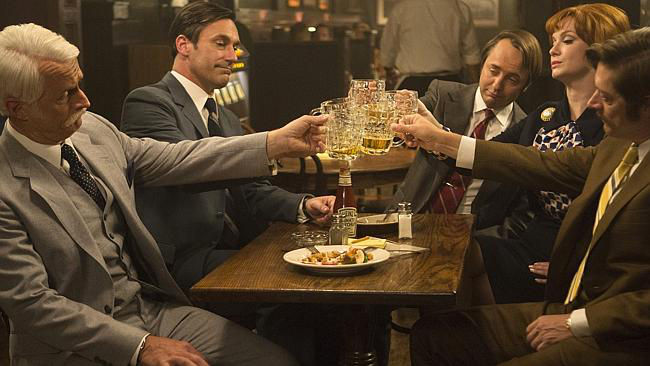
–
Matt Roden works at the Sydney Story Factory, and co-hosts both Sydney storytelling night Confession Booth and FBi Radio’s Saturday morning film & TV show, Short Cuts. His illustration and design work is here.
